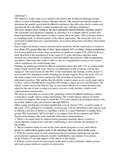| dc.description.abstract | The objective of this study was to identify and analyze the livelihood challenges facing
elderly women in Kandara location, Maragua district. The research specifically sought to
determine the gender/ age related livelihood experiences that affect the elderly women and
also identify how the elderly women respond and cope with these challenges.
The study adopted snow balling as the most appropriate non-probability sampling method.
The researcher used purposive sampling in selecting a few available elderly women who
helped in identifying other elderly women (women above 60 years). This is because there is
no sampling frame or official register of the elderly population. The researcher used well
structured in-depth interviews questionnaires, focus group discussions and direct observation
in this study.
Due to improved medical science and preventive medicine, the life expectancy of women is
now about 10% greater than that of men. Approximately 64% of elderly African populations
live in areas defined as rural, a large proportion of which are women (UN, 1992). In Kenya,
more than half of the population is in the range of 15 years and below and thus much
research has concentrated on children, youth and middle aged persons while marginalizing
the elderly. This study thus seeks to offer a voice to a marginalized section of our society,
whose experiences are worth looking into.
Findings on gender/age related livelihood experiences show that only 17% of women in the
study sample can read and write. This has an implication on the economic activity they
engage in. The study found out that 90% of the respondents had farming as their source of
income and 83% depended on their offspring for income support. From this study, 47% of
the study sample were widows and had no full ownership of land due to patrilineal
inheritance practices. This implies that the elderly women cannot access credit using land as
a surety. Land ownership based on gender still remains a major issue in rural Kandara. The
elderly women can use the land but they do not possess the power to make decision with
regard to the sale of land or using it as surety to access credit facilities, which would
empower them economically.
The study revealed that as a result of the gender/age related livelihood challenges; elderly
women have sought various coping mechanisms. The women largely depend on family
networks for support. The study revealed that 77% of the sample acknowledged annual visits
from their children and cash donations through MPESA.
Other coping mechanisms included membership to local church (77%). A small sample of
the study (37%) affiliated to community social groups. The key informants cited reasons such
as illiteracy and lack of money to contribute weekly as a major hindrance to joining these
groups. The respondents (80%) felt little or no support from the government and NGOs.
Based on the findings, the study made the following recommendations:
1. There is an urgent need for empowerment programs targeting elderly women to
ensure that they remain active and fully contributing to the economic development of
the country.
2. The government needs to scale up the cash transfer program to cover more elderly
people to cushion them against some of the challenges that they raised in this study.
3. With the current trends of rural-urbanization the government, media houses and non
governmental organization should consider establishment and creation of awareness
on the benefits of care and support of the elderly by the family.
4. Elderly women need to be encouraged on the need to join community support groups
and form groups which are sensitive to their needs. | en |


